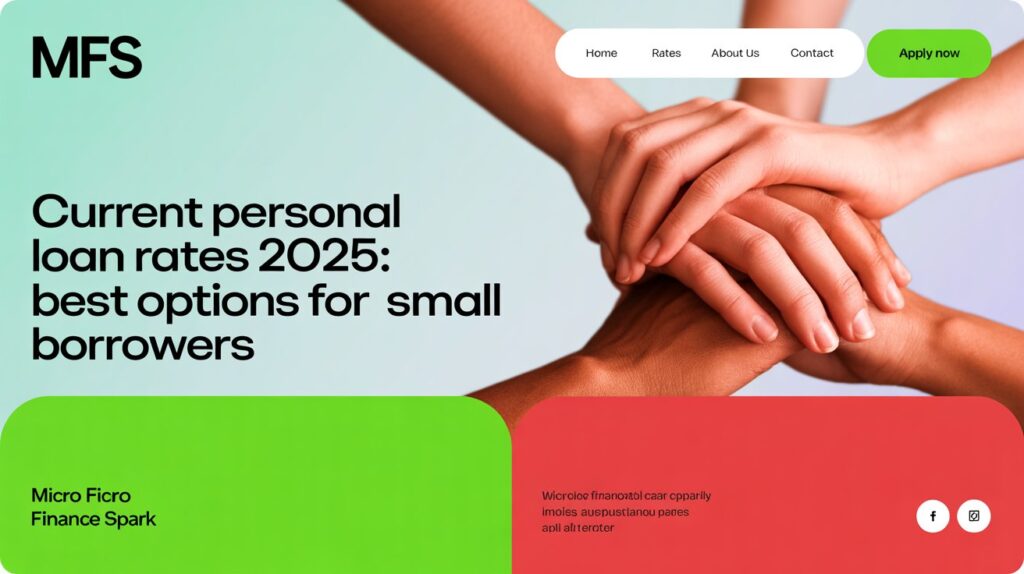Looking to borrow smart in 2025? Don’t miss the latest on current personal loan rates—they’re shifting fast. This guide demystifies which are the very best options for people applying for small loans seeking low rates and flexible terms.
Best Personal Loan Rates 2025
So going out for the current personal loan rates in 2025 will save time and borrow money shrewdly. Personal loans have great interest rate differences from one lender to another according to one’s credit score, income, and who is lending in this economy.
Under Islamic law (shari’ah), any loan that involves an interest or riba is haram which is clearly outlined in Qur’an (Surah Al-Baqarah 2:275) and Hadith. Hence it is important for Muslims to find without interest of halal sources of financing alternatives.
Make Your Property More Energy Efficient
The current personal loan rates in personal finance is the way to go about making your house green and energy efficient by putting insulation, installing solar panels, or incorporating double glazing.
These can incur cost savings on bills in the long run. Many lenders in 2025 will advertise special green personal loans where interest rates will be low, thus encouraging environmental improvement.
Islamically, more sustainable and stewardship improvements to property are all in line with the Qur’anic directive that supports resource wastage (Surah Al A’raf 7:31); thus this action would qualify as a good investment, assuming without engaging in interest.
Best £5,000 Loans Over Three Years
For about three years, the current personal loan rates of £5,000 will probably be the most popular option if you want to borrow a short amount of money with relatively low monthly repayments. In 2025, the rates on these loans typically range between 6 and 9 percent APR, depending on the lender and your credit rating.
However, in Islamic finance, the best way is the Qard Hasan, which is a benevolent loan that does not have interest charges, which was practiced by the early Muslims and is recognized in the Sunnah.
Best £10,000 Loans Over Five Years
For example, stretching £10,000 for 5 years to pay lower monthly payment may result in a higher interest amount paid over the period. Usually, the best rates in 2025 are below 7% APR for excellent borrowers but those without a favorable credit profile will see huge increases in their interest rates.
“Borrowers must, however, adhere to the Islamic way and not collectively engage in borrowing through Muslim banking products devoid of riba and which evidence the Shari’ah ethic of fair risk-sharing like the Mudarabah (profit-sharing) financial mode.”
Best £15,000 Loans Over Five Years
The £15,000 loan over a period of five years is often used for large-ticket expenses like a wedding, car purchase, or home renovation. The leading lenders in 2025 will offer competitive interest rates starting from 5.5% to 8.5% APR, and the overall cost can still be considerable.
The Qur’an (Surah Al-Imran 3:130) contains a definite warning against Muslim lending on interest. Therefore taking a loan with interest must be avoided by Muslims; instead, a financier complying with Shariah principles should be considered in conjunction with ethical lending practice.
£25,000 Loans Over Five Years
Taking a £25,000 loan over five years is a reckoning, in fact, one of the larger commitments used for debt consolidation or changes in life. The current personal loan rates in 2025, some of the best lenders will provide the lowest interest rates starting at 4.9% APR for those with high credit score ratings.
Islamically, riba should be avoided as far as possible while getting the desired targets in personal finance; therefore, a Shariah-based contract like Ijara (which means leasing) or Murabaha (cost-plus financing) is preferred to govern such large amounts of financing.
How We Choose the Best Rate Personal Loans
We look at the interest rate (APR), the repayment flexibility, penalty for pre-payment, and trustworthiness of lenders in pursuit of finding the most favorable rates on personal loans.
We further analyze how well the loan serves particular borrower needs such as small loans, fast credit decisions, or poor credit.
In an Islamic context, to choose the “best” means that the loan is affordable and ethical without those prohibited elements such as uncertainty (gharar) or riba.
5 Tips for Borrowing with a Current Personal Loan
To begin with, borrow only what you genuinely require—never overextend. Secondly, compare interest rates, but also check fees, terms, and hidden costs.
And most importantly for Muslims, these would be halal options such as interest-free loans from Islamic banks or community programs which follow the Prophet Muhammad’s teachings on how to lend responsibly.
Check Your Eligibility
Prospective borrowers should check their eligibility for a loan before applying so as to reduce the strain of unnecessary credit checks. Some basic criteria are examined by lenders such as the credit score, income, debt-to-income ratio, and employment history.
Sunnah teaches that a loan is given to meet the borrower’s need but not to dispense with the money; thus, delaying repayment of a loan by a rich man is an injustice.”
The obligation under God’s universal law should be matched with all purposes behind seeking a loan since fulfilling debts is a moral obligation prescribed in the Sunnah for Islamic borrowers.
Borrow Over the Shortest Period
Generally, shorter loan terms will mean less overall paid in interest. While monthly payments will be higher, it is a long-term savings for you.
In accordance with the Wisdom of the Messenger, borrowing less and borrowing for short periods is a Command among Muslims. The Prophet asked Allah’s refuge from long-term debt because of its adverse effects on the spiritual and material welfare of humans.
Check for Early Repayment Charges
Some lenders impose a charge for early repayment of the loan in case one repays before the term ends. The fine print must always be read-these charges may negate the savings one thought would be made.
Islamic laws call for the lending contract to be clear and fair, without hidden penalties, in order to avoid any exploitation in financial dealings (Qur’an: Surah Al-Mutaffifin 83:1-3).
Check if a Loan Is the Cheapest Way to Borrow
Is the current personal loan rates the cheapest option? Consider this before signing for the loan-Is a personal loan an exceptionally cheap option? Sometimes it is conceivable that a 0% balance transfer credit card, a favor by family members, or a halal savings circle (committee) could be more financially viable.
Average Personal Loan Interest Rates
In the year 2025, averages are resting between 6% to 10% APR for current personal loan interest depending on credit and lender. Online lenders might provide a little more competitive pricing while traditional banks lean toward stability.
Muslims consider any kind of interest riba, and Islamic financing measures probably don’t apply to even the concept of “average”.
Average Current Personal Loan Rates by Credit Score
Generally, good credit should bring interest rates close to approximately 5% APR, whereas very poor credit might raise it above 20%. Each lender assesses risk in determining their rates, with credit score being one of the primary factors considered.
Islam does not embrace interest-compliant scoring, favoring instead treatment based on trust, fairness, and character, norms followed in Islamic banking with personal judgment and moral contracts.
Percentage of Borrowers by Current personal Loan Purpose
People borrow for many reasons: debt consolidation, home improvements, medical bills, or big purchases. Recent data shows over 40% of personal loans go toward consolidating existing debt.
In Islam, borrowing is not forbidden—but should be done only out of necessity, and never for luxury or overspending (Hadith: “The borrower who intends to repay is helped by Allah”).
Average Debt Consolidation Rates
As of 2025, average debt consolidation loan rates typically range between 6% to 12% APR depending on the borrower’s credit profile. These loans are designed to amalgamate various debts into one regularly scheduled payment.
From an Islamic perspective, however, debt consolidation should never contemplate interest-based refinancing but must instead seek interest-free repayment mechanisms that ensure adherence to the riba prohibition.
Debt Consolidation Rates by Credit Score
The borrowers with high credit scores—usually above 720—get lower consolidation rates, usually less than 7% APR. If the borrower has a fair or poor credit standing, he may be charged for anything above 15%, making the loan expensive over time.
Thus, Islamic finance takes not only risk into consideration, but also all ethical concerns and mutual benefits from various angles, ensuring that financial exploitation does not occur solely due to status.
How Economic Factors Impact Loan Rates
The economy determines interest rates on current personal loan rates -inflation increase or changes in central bank interest rates lead to an increase in loan APR by lenders.
Generally speaking, a healthier economy would give better rates, whereas uncertainty will take rates higher.
Islamic finance puts emphasis on asset-backed lending and profit-loss sharing, as such it circumvents the need for interest rate hikes during volatile economic times, thus providing greater stability and transparency in transactions.
What Are Current Personal Loan Interest Rates?
Current personal loan interest rates are the cost that you incur to borrow money, which is represented as a percentage of the loan amounts. The lender may determine whether the percentage of interest is to be fixed or variable rates, depending on the agreement you make with him.
In Islam, charging interest (riba) is strictly forbidden (Surah Al-Baqarah 2:278-279); therefore, the Muslims should look for halal means of financing that would not require interest altogether.
How Current Personal Loan Rates Are Determined
The lenders dictate your interest rates on current personal loan rates using parameters such as your credit score, income, loan amount, and the term of repayment. A higher credit score usually drags lower rates while riskier borrowers pay more for loans.
In Islam financing, one does not determine the rate by interest, but according to the profit margins applied upon agreement, as by Murabaha or Mudarabah, which is lawful and quite evident.
Fixed vs. Variable Interest Rates
A fixed interest rate prevails as you take out a loan, keeping your monthly payments unchanged. A variable interest rate, on the other hand, has the prospect of fluctuation to reflect market conditions-it may start off low and rise later.
From the Islamic financing view point, these two forms of interest (riba) are impermissible and thus Muslims must refer to Shariah-compliant contracts free from any fluctuating or fixed interest charges.
How to Qualify for the Lowest Personal Loan Rates
In order to qualify for the most favorable current personal loan rates, an individual would be required to have a very good credit score and a steady income, as well as a low debt-to-income ratio. Besides these, lenders will also look into applicants’ payment histories and present credit utilization before presenting the most competitive rate they have to offer.
In an Islamic manner, the focus is more on promoting just and equitable lending by using alternative models such as Ward Hasan (benevolent loans) or Ijara, conforming to the religious guidelines, rather than lowering interest.
Credit Score Requirements for Low Interest Loans
Borrowers with a credit score greater than 700 typically qualify for the best current personal loan rates. Those in the 600s can still be approved but at higher ratios that considerably increase the overall cost.
Islamic finance does not just rely on credit scoring; it builds instead on moral trust and financial integrity, with mutual consent and terms ensuring that funding is available in a more inclusive manner without being tainted with riba.
Debt-to-Income Ratio (DTI) and Loan Eligibility
Your DTI compares your total monthly debt obligations with your income. Most lenders would like you to have a DTI of 40% or less. The lower your DTI, the better the chances that you will repay the loan, perceived as low risk to the lender.
Islam insists on the importance of moderation in spending. Over-indebtedness was discouraged in the Qur’an, which also speaks of a balance in life and the acceptance of responsibility in Surah Al-Furqan 25:67.
Tips for Improving Your Loan Approval Chances
If you want to boost your chances of loan approval, start by paying bills on time, reducing credit card balances, and not adding new debts prior to loan application. Checking your credit report for errors and building a longer credit history can also make a difference.
However, if you are seeking Shariah-compliant financing, put more emphasis on finding lenders who are ethical and consider financial honesty and cooperation mutual, not simply creditworthiness.
Short-Term vs. Long-Term Loans: Which Has Lower Rates?
It is observed that a short-term current personal loan rates incurs low total interest costs. However, due to higher monthly payments, the long-term aspects entail paying a higher total interest cost, making it, in overall terms, more costly.
Attributing to the nature of Islamic finance, it endorses the quick settlement of debts, prohibiting riba from any borrowing, thus putting preference towards shorter, interest-free avenues wherever imperative.
Secured vs. Unsecured Current Personal Loans: Interest Rate Differences
A secured Current personal loan is a loan that is backed by collateral such as a car or property, and thus is given at a lower rate of interest. An unsecured loan, on the other hand, does not require col-lateral, so the lender has to charge a higher rate to cover the risk.
Under Shariah, it is permissible for security (rahn) to be included in contracts, but the underlying transaction must be free of riba, and if default occurs, consideration must be given to ensuring that the collateral is realized ethically and equitably.
Online Lenders vs. Traditional Banks vs. Credit Unions: Where to Find the Best Rates
Online lenders seem to have more approvals within a shorter time and competitive rates, especially if a borrower has excellent credit status. The traditional bank offers a more personal service but requires stricter qualifications than a credit union would, which provides lower rates for members.
However, for Muslim borrowers, the go-to institutions will be Islamic banks or certified halal fintech for loans because rather than having issues in deriving viability from the extractives of Qur’anic principles and ethical lending, they have fully complied with all Qur’anic principles and ethical lending.
Pros and Cons of Low Interest Loans
The benefits of these include lower monthly payments, easier budgeting, and reduced financial stress. Disadvantages may include: fees, penalties, and sometimes just the temptation to borrow more than you may really need.
For Muslims, even low interest is impermissible, as the real “advantage” lies in halal lending models that would give solutions without compromising one’s faith.
How to Apply for a Low Interest Personal Loan
Start by comparing lenders, checking your credit score, and gathering documents like proof of income and ID. Then apply online or in-person, and if approved, review the Current personal loan terms carefully before accepting.
From an Islamic view, one should pursue Shariah-compliant financing, where the process involves transparent contracts, mutual consent, and zero interest—protecting both parties from unjust gain or harm.
Common Mistakes to Avoid in the Application Process
Many borrowers rush through the application without checking their credit report or comparing loan offers. Others overstate their income or forget to read the fine print—both can lead to denial or future problems.
Islam teaches transparency and honesty in financial dealings (Hadith: “The seller and buyer have the option… if they speak the truth and make clear the defects, they will be blessed in their transaction”).
What to Do if You’re Denied a Personal Loan
If you’re denied, don’t panic—first, ask the lender why. Then review your credit report for errors, reduce your debts, and apply again after strengthening your financial profile.
In Islamic finance, if a loan is necessary, seek community-based lending, interest-free options, or Qard Hasan, which allows borrowing based on trust and need, not just credit metrics.
Alternatives to Personal Loans with Low Interest Rates
Instead of Current personal loans, you might use savings, employer advance programs, or even credit unions offering better terms. For Muslims, alternatives like halal co-ops, Islamic microfinance, or family/community support can replace conventional borrowing.
These methods align with the Qur’an’s encouragement to help others without exploiting their need (Surah Al-Baqarah 2:280).
Balance Transfer Credit Cards vs. Low Interest Loans
Balance transfer credit cards offer 0% interest for a limited time, making them ideal for short-term debt repayment. However, missing a payment can lead to high penalty rates, unlike a fixed low interest loan that’s more predictable.
While both involve riba, in Islam, neither is halal—so it’s better to consider non-interest financial tools that support ethical debt clearing.
Home Equity Loans and HELOCs as Alternatives
A home equity loan gives you a lump sum using your property as collateral, while a HELOC works like a credit line. Rates can be lower than personal loans, but your home is at risk if you can’t repay.
Islamic alternatives like Diminishing Musharakah (shared ownership) allow property-based financing without riba, following a profit-sharing model rather than charging interest.
Peer-to-Peer Lending and Other Low-Cost Borrowing Options
Peer-to-peer (P2P) platforms connect borrowers directly with individual lenders, often at lower rates than banks. While attractive, many P2P loans still include interest, making them unsuitable for Muslims unless explicitly Shariah-certified.
New halal P2P models are emerging globally, offering ethical funding options based on partnership, not profit from debt.
Factors Affecting Average Personal Loan Rates
Your credit score, income, loan amount, and repayment period all affect the rate you’re offered. Lenders also adjust rates based on economic conditions, default risk, and borrower history.
In Islamic finance, however, rates aren’t set through interest but through agreed-upon terms, with risk and reward shared fairly—not charged as a fixed cost.
Must read about: Halal Crypto Screening 2025 | Easy Shariah-Compliant Investment
Conclusion
In 2025, understanding the current personal loan rates is essential for small borrowers aiming to make smart financial choices. Whether you’re consolidating debt, covering expenses, or upgrading your home, comparing rates and terms helps you save more over time.
For those following Islamic finance, it’s crucial to avoid interest and explore Shariah-compliant alternatives. Always consider your repayment ability, loan purpose, and available options before committing.
By staying informed, you can find the best personal loan options that match your needs while keeping borrowing affordable and ethical in the year ahead.
Meta Description
Compare the current personal loan rates 2025 and discover the best options for small borrowers with smart, low-cost financing tips.

Maria Jolly is an experienced blogger at Micro Finance Spark, passionate about simplifying finance for everyday readers. With a sharp eye on trends in crypto, markets, budgeting, and smart saving, Maria delivers insightful, easy-to-understand content to empower informed financial decisions.






